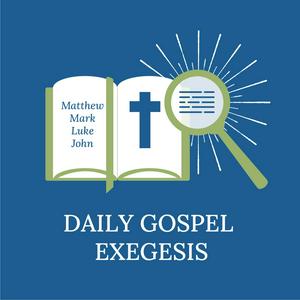To support the ministry and access exclusive content, go to: http://patreon.com/logicalbiblestudy
For complete verse-by-verse audio commentaries from Logical Bible Study, go to: https://mysoundwise.com/publishers/1677296682850p
Matthew 5: 43-48 - 'Pray for those who persecute you.'
Catechism of the Catholic Church Paragraphs:
- 1933 (in 'Social Justice') - This same duty extends to those who think or act differently from us. the teaching of Christ goes so far as to require the forgiveness of offenses. He extends the commandment of love, which is that of the New Law, to all enemies. Liberation in the spirit of the Gospel is incompatible with hatred of one's enemy as a person, but not with hatred of the evil that he does as an enemy.
- 2844 (in 'The Seven Petitions')
- 2303 (in 'Peace')
- 2842 (in 'The Seven Petitions') - You, therefore, must be perfect, as your heavenly Father is perfect"; "Be merciful, even as your Father is merciful"...It is impossible to keep the Lord's commandment by imitating the divine model from outside; there has to be a vital participation, coming from the depths of the heart, in the holiness and the mercy and the love of our God. Only the Spirit by whom we live can make "ours" the same mind that was in Christ Jesus (abbreviated)
- 2608 (in 'Jesus teaches us how to pray') - From the Sermon on the Mount onwards, Jesus insists on conversion of heart: reconciliation with one's brother before presenting an offering on the altar, love of enemies, and prayer for persecutors, prayer to the Father in secret, not heaping up empty phrases, prayerful forgiveness from the depths of the heart, purity of heart, and seeking the Kingdom before all else. This filial conversion is entirely directed to the Father.
- 1825 (in 'Hope') - Christ died out of love for us, while we were still "enemies." The Lord asks us to love as he does, even our enemies, to make ourselves the neighbor of those farthest away, and to love children and the poor as Christ himself.
- 1968 (in 'The New Law') - The Law of the Gospel fulfills the commandments of the Law. the Lord's Sermon on the Mount, far from abolishing or devaluing the moral prescriptions of the Old Law, releases their hidden potential and has new demands arise from them: it reveals their entire divine and human truth. It does not add new external precepts, but proceeds to reform the heart, the root of human acts, where man chooses between the pure and the impure,where faith, hope, and charity are formed and with them the other virtues. the Gospel thus brings the Law to its fullness through imitation of the perfection of the heavenly Father, through forgiveness of enemies and prayer for persecutors, in emulation of the divine generosity.
- 2262 (in 'Respect for Human Life') - In the Sermon on the Mount, the Lord recalls the commandment, "You shall not kill,"and adds to it the proscription of anger, hatred, and vengeance. Going further, Christ asks his disciples to turn the other cheek, to love their enemies (abbreviated)
- 2828 (in 'Give us this day our daily bread')
- 1693 (in 'Life in Christ') - Christ Jesus always did what was pleasing to the Father,5 and always lived in perfect communion with him. Likewise Christ's disciples are invited to live in the sight of the Father "who sees in secret," in order to become "perfect as your heavenly Father is perfect."
- 2013 (in 'Christian Holiness') - "All Christians in any state or walk of life are called to the fullness of Christian life and to the perfection of charity." All are called to holiness: "Be perfect, as your heavenly Father is perfect."
Got a Bible question? Send an email to
[email protected], and it will be answered in an upcoming episode!


